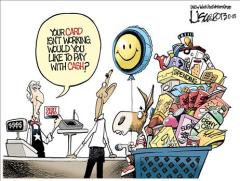The wailing and hysteria in Washington is over. The politicians now have the authority to borrow more money and the bureaucrats are all back at work (rested and refreshed after their paid vacation, so they’ll probably tax, spend, and regulate with extra fervor).
So what can we say about this fight? I have five semi-random observations about what happened.
1. It was a fight worth having, even though there was virtually no chance of derailing Obamacare.
With America’s separation-of-powers system, the House of Representatives had the ability to force a fight about Obamacare, but it didn’t have a realistic shot at winning the fight. I suspect President Obama would have chosen to deliberately default if necessary to thwart Republican efforts to defund or delay the law.
That being said, I’m glad the Tea Party-oriented members chose to take a stand. They focused attention on a bad law. They forced the left to play defense. Simply stated, they were willing to take a stand against the ongoing Europeanization of the American economy. That’s something to admire, not criticize.
2. Any strategy to reduce the burden of government will have to overcome an establishment media that is philosophically biased and politically partisan.
Maybe it’s just my own naiveté, but I’m surprised that so many journalists are one-sided partisans. They don’t write stories explaining that the government shut down because Democrats rejected House-approved legislation defunding Obamacare (which accurately depicts the shutdown as being the result of a disagreement between Democrats and Republicans). Instead, they have screaming headlines about “Republicans shut down the government.”
Recommended
Even more disturbing, I had several conversations with journalists explaining that the United States would not default if the debt limit wasn’t raised. The federal government, I explained, will be collecting 12 times as much revenue as required to pay interest on the debt. And I shared quotes from several establishment budget experts who agreed with my assessment. Yet those journalists inevitably wrote stories about “Republicans pushing US closer to default.”
3. The shutdown will probably be a political plus for advocates of small government.
Notwithstanding the polling data, I’m not worried about political damage because of the shutdown-debt limit fight. In the short-run, the fight sidelined the left’s agenda. Instead of debating how to expand government or how to raise taxes, we had a battle over Obamacare. That’s a good thing. And as more and more people learn about the deep flaws of the President’s main “achievement,” they will begin to appreciate in the long run that some lawmakers wanted to curtail government-run healthcare.
This won’t stop the media from talking about a “defeat” for the Tea Party, both because they’re lazy and also because they want to discourage advocates of small governments from future fights. For what it’s worth, I strongly suspect the 2014 election will generate good results for the Cruz-type lawmakers. Indeed, it’s worth noting that congressional Republicans did very well in the 1996 elections, even though conventional wisdom said they would suffer as a result of the 1995-96 shutdown fight.
4. Fans of political drama should be happy since there will quite likely be another shutdown-debt limit fight in a few months.
 Yesterday’s agreement kicks the can down the road. The “discretionary” parts of the government are now funded through January 15 and the government’s new borrowing authority will last through February 7.
Yesterday’s agreement kicks the can down the road. The “discretionary” parts of the government are now funded through January 15 and the government’s new borrowing authority will last through February 7.
That almost surely means we’ll have a similar fight early next year.
5. To win that future fight, the GOP establishment and the insurgents should agree on a common strategy.
From a political perspective, Democrats had a big advantage in the recent fight because they locked arms and agreed to unanimously resist the efforts to curtail Obamacare. This meant they had to cast some tough votes in favor of the individual mandate and in favor of Obama’s special exemption for Capitol Hill. But that unified strategy put them in a stronger position than Republicans, who may have agreed on the goal of curtailing Obamacare but disagreed on the tactics of Cruz and his allies.
This is why my main advice to friends on the Hill (both from the establishment and insurgents) is to sit down over the next month or so and agree on a common strategy. If they did that, the insurgents would learn that the establishment crowd is sometimes willing to do the right thing (such as the Ryan budget) and the establishment lawmakers would learn that the insurgents are willing to push for more modest changes. I’m not sure what specifically that would mean. Maybe they’ll agree to go after Obamacare again, or some specific feature of that boondoggle law. Maybe they’ll push for overall entitlement reform. Or maybe they’ll go with my top choice, which is some sort of spending cap akin to the Swiss Debt Brake, such as Congressman Brady’s MAP Act.
If you’re interested in these topics (or if you’re a glutton for punishment), Chris Edwards and I spent almost one hour discussing all these topics in this recent Cato e-briefing.
If you want something only about half as long, I recommend my video series on the economics of government spending.
























Join the conversation as a VIP Member